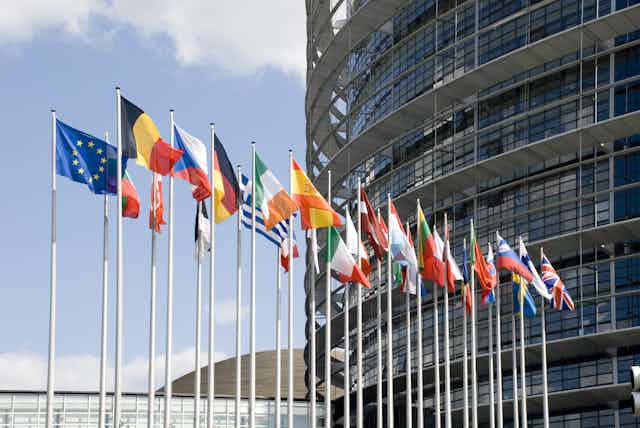As the UK prepares to leave the EU, it has a huge number of considerations to ensure its economy prospers. One, which is perhaps overlooked, is Britain’s language policy and how important this is as an economic resource. A strategic language policy and the cultivation of language experts in post-Brexit Britain are essential if it wants to connect with fresh markets overseas.
This has long been a feature of international diplomacy – stretching back long before globalisation as we know it. All the big powers of the Old World depended on understanding other people’s languages to trade across cultures. A “modern” solution was found in Babylonia, an ancient commercial metropolitan hub in the Near East, where a polyglot community of traders came together from the Mediterranean, Persia and Turkey, and beyond.
There are accounts of King Hammurabi deftly exploiting his city’s growing cultural mix as a resource in the 1790s BC. He used bilingual foreign traders as cross-cultural brokers. With their language skills, they played a key role in facilitating long-range trade with distant markets.
One of the biggest challenges facing the UK economy now is a skills shortage. Although funding is promised to support technical skills training, UK business also requires professionals with language skills to achieve sales in fresh markets. These experts will need to speak the languages of trading partners and understand the cultures of new overseas contacts to negotiate and seal deals. Investment in this crucial soft skill is needed.
Government statistics show that the UK loses about 3.5% of its GDP every year because of a lack of language skills and cultural awareness in the workforce. Such losses appear to be symptomatic of a chronic condition of under achieving in British business. More than a decade ago, the British Chambers of Commerce found that linguistic and cultural barriers led to loss of contacts, turnover and profitability – and also to a reluctance to tackle new markets. This latent lack of language skills in the workforce suggests that the UK is already overdependent on Anglophone export markets.
This economic fallout caused by communication barriers must be addressed. Without investment in language skills, trade relations and export performance will suffer more post-Brexit. With many British people confessing they are bad at speaking foreign languages, now more than ever, multilingual professionals are needed to forge contacts with new markets outside the EU.
Cajolery and seduction
Some might argue that, in reshaping a new economic approach, Britain will draw on the former Commonwealth – where the language spoken will predominantly be English. But proponents of (what has been dubbed as) Empire 2.0 will come up against the reality that the rest of the world has moved on. The global economy’s key emerging markets stretch beyond the Commonwealth to China, Brazil, Turkey, Indonesia and Vietnam. And the UK will also still have key trading partners across the EU.
In a situation where fresh markets are sought in different parts of the world, growing a multilingual skills base must be a priority. The UK is lucky that it already has a highly cosmopolitan society, with immigrants from all over the world settled there. In the first instance, this will be a big positive post-Brexit. But longer-term investment is needed.

As Richard Hardie, the chairman of the investment bank UBS, puts it:
A deep understanding of foreign languages is often essential to the combination of cajolery and seduction many companies require in their international negotiations. [However] the really valuable negotiators are those able to produce subtle phrasing to persuade someone from another culture to do something they would not otherwise want to do.
The UK is about to embark on a series of trade negotiations with foreign countries post-Brexit. If Hardie is right, the negotiating teams will have to be packed with foreign language experts.
Grasping the subtleties
But the functional benefits of multilingual expertise are only part of the story. Anyone employed to ease negotiations overseas also needs an intercultural awareness.
In the words of KPMG’s French executive, Isabelle Allen:
I’ve met a lot of people who are totally monolingual and can’t read a room of speakers [from different language backgrounds] … they do not know what people are [actually] saying.
This is because language is full of nuance, it requires reading between the lines and understanding subtle turns of phrase or cultural references. For example, Westerners need to understand that the Chinese do not like to say “no”, preferring instead a vaguer “let’s see”. Clearly, intercultural sensitivity is a bonus at the negotiating table.
This means that native English speakers cannot simply take advantage of the rest of the world’s desire to learn their language. Just as monolingual Britons will not grasp the subtleties of interactions in international business, they do not know what gets lost in translation, too. As I show in my book Linguanomics, on the market potential of multilingualism, to ignore this leads to greater misunderstandings and lost opportunities.
Brexit is a wake-up call for a strategic languages policy in the UK and in particular to mobilise the already rich multilingual resource that the cosmopolitan UK represents. There must be long-term strategic investment in languages education at all levels. Companies will also benefit from funding for language skills training, which in turn will be a means to generate more revenue. Here is a golden opportunity for government to support cross-sector language initiatives to ready the UK for new trade constellations across the globe.

